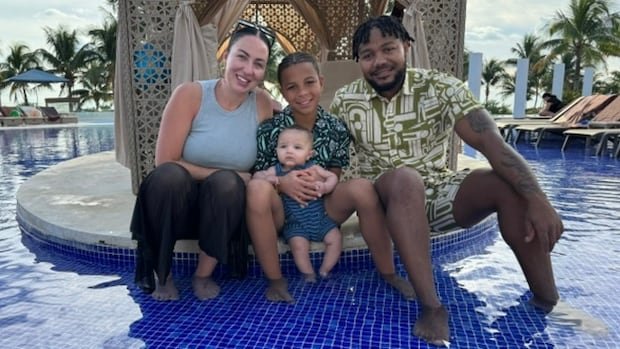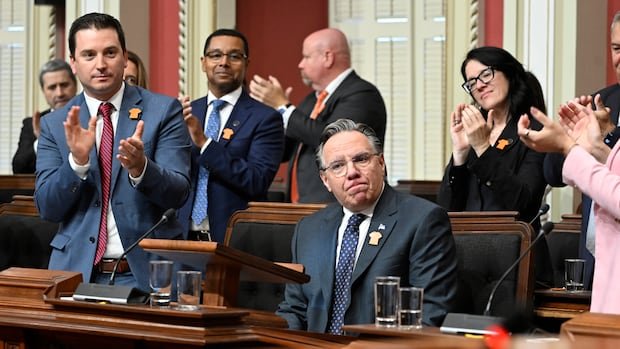Two Saskatchewan families say they felt more like hostages than resort guests in Mexico when they became seriously ill and were pressured by staff to sign a non-disclosure agreement (NDA) in exchange for medical help.
Jesslyn Schigol, her husband and their two children, a teenager and a four-month-old baby, traveled from Yorkton, Sask., to the Royalton Splash Riviera Cancun in Mexico for a Christmas vacation. On Christmas morning, Schigol sought medical help at the resort’s front desk when her husband couldn’t stop vomiting, his second bout of illness following his arrival about a week earlier.
“The front desk presented me with this confidentiality agreement and said, ‘You have to sign this. It’s mandatory or else we won’t send the doctor to see your husband,'” Schigol said.
“I said, ‘There’s no way I’m signing this since it pretty much says you can’t say anything, you can’t come after the hotel,'” he said. “They said they wouldn’t send the doctor unless I signed this.”
Schigol took a photo of the confidentiality agreement he was asked to sign. It appears to indicate that by accepting medical help provided by the resort, guests cannot hold the companies involved accountable and are prohibited from speaking publicly about their experience.
Allison Field, her husband and their four-year-old son fell ill two days after traveling from Saskatoon to the same resort for their Christmas vacation. When her husband and son became sick again three days later, Field decided to leave the resort and take her son to the hospital because he seemed very sick.
Field said resort staff were reluctant to help her move her bags or book them a taxi, and that they pestered her to sign a confidentiality agreement before leaving.
“My son was throwing up and throwing up and shaking and they wouldn’t let us out, and [staff] I kept trying to get him to sign the confidentiality agreement,” Field said.
“So yeah, I was incredibly upset… It was blatantly clear that they didn’t really care about us or our health.”
Allison Field says her family felt more like hostages than guests at a Marriott resort in Mexico when they became seriously ill and were pressured by staff to sign a confidentiality agreement.
Field and Schigol did not sign a confidentiality agreement, but they know other guests who did. They said compensation offers ranged from $500 to $1,000. The two Saskatchewan families, who didn’t know each other before connecting through their experiences at the resort, want what happened to them to serve as a warning to other travelers.
Royalton Splash Riviera Cancun is owned by Blue Diamond Resorts. The resort is also part of Marriott’s “Autograph Collection” business, which allows independently owned resorts to use the Marriott brand and loyalty rewards programs.
Questions sent to Marriott were referred to Blue Diamond Resorts. An emailed statement confirmed that the company is investigating the claims.
“We are currently conducting an internal investigation into the reports and while we cannot comment further at this time, please know that we are committed to addressing this matter with the utmost care and attention,” said Alejandro Rodríguez del Peón, vice president of marketing. and public relations for Blue Diamond Resorts.
He added that the resorts operate with “strict standards that meet or exceed local public health regulations.”
NDAs not uncommon, says professor
The use of non-disclosure agreements at resorts is becoming more common as companies struggle to control brands and reputations in a highly competitive tourism industry, said Wayne Smith, director of the hotel and tourism research institute at the Ted Rogers School of Management at Metropolitan Toronto. University.
But that doesn’t make for good customer relations.
“The message the NDA sends is that we are not going to fix this problem. We don’t care if our guests get sick,” Smith said.
“That’s not the image you want to convey to the broader audience when news about NDAs comes out. It’s not good business practice.”

Smith suspects that NDAs in this case are not official company policy but the work of local management and staff. He said it’s a good idea to buy travel insurance, especially for international travel, and suggested that travelers learn which foods are most likely to be contaminated.
“Leafy greens, things like meat that’s been sitting out a long time, buffet foods, those are all more likely to have pathogens and other things that will make you sick compared to freshly prepared foods,” Smith said.
Field and Schigol said they noticed poor food handling techniques during their stay.
Field’s son was hospitalized for 16 hours due to dehydration. They have travel insurance that will likely cover the bill, but they had to pay out of pocket at the hospital before their son could receive care. Field said she has been in contact with two dozen other people who stayed at the resort and became sick around the same time she did.
“I felt like we were being kept from getting care. I felt like I was being held hostage,” Field said.
“People signed the NDA because if they’re really sick and they really need to go to the hospital, sometimes they just sign it. But it’s totally under duress. An NDA signed like that, is it really legal?” ?”









